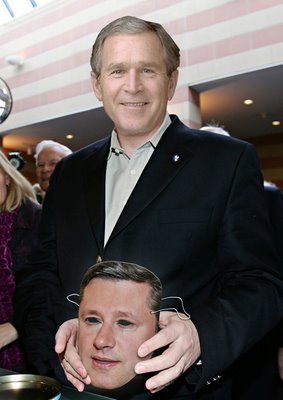According to
this University of Minnesota study most Americans rank atheists as the least-trustworthy minority (via
Majikthise). From the article:
“Americans believe they share more than rules and procedures with their fellow citizens—they share an understanding of right and wrong. Our findings seem to rest on a view of atheists as self-interested individuals who are not concerned with the common good.”
Maybe the problem is that, in highly religious communities, many people of faith don't get a chance to personally interact with atheists. If you label someone an ‘atheist’ and leave it at that, then you can hardly blame a naïve person for equating this to “no morals whatsoever.” Many agnostics and atheists are also humanists; I think it's difficult to interpret
the ethical principles behind humanism as promoting self-interest and untrustworthiness, and therefore much harder to pigeonhole a self-described humanist as ‘immoral’ than a self-described atheist.
On second thought, you'd think it would be difficult to interpret the Bible's teachings as promoting selfishness, but many Christians manage to do so. According to
this study from 2000, a majority of American church
leaders (!) believe the Bible teaches that “God helps those who help themselves.” I mean, what would Jesus think about
trickle-down economics?! Anyway, moving on:
Many of the study’s respondents associated atheism with an array of moral indiscretions ranging from criminal behaviour to rampant materialism and cultural elitism.
If religiosity has, in the modern world, been shown to have no correlation with human well-being, then how on earth can people come to the conclusion that
lack of religion is the
cause of social ills? In fact the correlation is the opposite: for a while now international studies have shown that nations with the fewest social ills and highest levels of well-being also tend to be the most secular. See
this study (PDF) for a comparison of “belief in God" versus social ills among developed countries, and then check out the rankings of those same countries on the
United Nations Human Development Index.
Can we then claim that religion hampers human well-being? Mmmmm...No. The U.S.S.R. was as secular as you can get. I think people on both sides suffer from distorted perceptions of how much impact religiosity has on the success of society. Studies also show that religious people are happier, so it depends on your definition of well-being I suppose. I
do however think it's fair to say that, from a humanist point of view, religion hampers the process of finding
rational ways to promote well-being if you use the United Nations'
definition of well-being and
definition of standard-of-living.
Atheists are also the minority group most Americans are least willing to allow their children to marry.
Aargh! Nooo!
The researchers also found acceptance or rejection of atheists is related not only to personal religiosity, but also to one’s exposure to diversity, education and political orientation—with more educated, East and West Coast Americans more accepting of atheists than their Midwestern counterparts.
No surprise there. After all, according to
Pat Robertson the atheist elite has infiltrated America's school system in a fiendish power grab! These atheist radicals pose a sinister threat:
... you don't want your child to be brainwashed by these radicals, you just don't want it to happen. Not only brainwashed but beat up, they beat these people up, cower them into submission!

watch video via Crooks and LiarsLOL Pat Robertson <sigh>. Seriously though, I think the observation of higher tolerance among the East/West Coast and college educated is predicted by the idea that people of faith who actually interact with atheists are more likely to distinguish between abandoning faith and abandoning ethics.





 The snake seems overly ... erect.
The snake seems overly ... erect.
